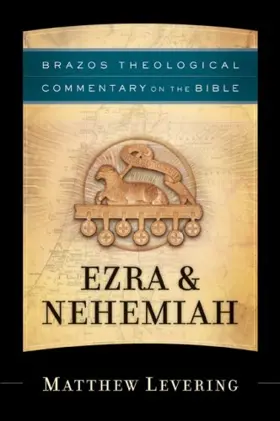

Ezra & Nehemiah
in Brazos Theological Commentary on the Bible
Pages
240
Publisher
Brazos Press
Published
1/1/2007
ISBN-13
9781587431616
Reviews
Matthew Levering's volume on Ezra-Nehemiah is an interesting exercise in both inter-canonical and redemptive-historical interpretation of Scripture. He manages to succinctly trace the events of Israelite history that set the stage for Ezra-Nehemiah as well as to demonstrate how the rebuilding of the Temple points forward to the coming of Jesus Christ, the bodily manifestation of God's presence who dwelt among us (cf. John 1:14). The inter-canonical discussion helps readers understand why Ezra-Nehemiah is included in the Old Testament canon and its rightful place within the chronology of redemptive history. He clearly shows how the events of Ezra-Nehemiah are the fulfillment of Jeremiah's prophecies and are the remedy for sins committed during the time of Ezekiel and at other points in Israel's history. Since Ezra-Nehemiah are shorter than most Biblical books, Levering conveniently includes the full text of the book(s) set off by italics for his chapter-by-chapter analysis, although he doesn't designate verse numbers, so you'll need an English translation beside you in order to follow him. It was refreshing that Levering clearly shows his interaction with outside sources, most notably commentaries by the Venerable Bede (the eighth century mystic), Joseph Blenkinsopp, F. Charles Fensham and Mark A. Throntveit. (It's disappointing that the series editors couldn't wait until after the release of the forthcoming replacement volume for Fensham's NICOT by Hannah K. Harrington before releasing this volume by Levering. The newer NICOT volumes surpass the older ones in both exegetical depth and theological reflection. It would have been great to read Levering's interactions with her work and undoubtedly improved this commentary.) The downside to this is a seeming overuse of Bede's more allegorical commentary, which overspiritualizes an otherwise excellent read in some instances, making it read like Matthew Henry's Commentary on the Whole Bible at times. Levering certainly has created a volume that motivates readers to do some supplemental research. It would have been nice to read some deliberate interaction with the text of Ezra-Nehemiah itself though. For that, readers will need to consult more exegetical commentaries like those listed above as well as the standard Ezra-Nehemiah volume by H.G.M. Williamson in the Word Biblical Commentary. Levering successfully explains the historical events that precede Ezra-Nehemiah using an intertextual approach that enables readers to situate the book(s) within Israel's history. In addition, he offers some insightful Christological, Redemptive-Historical and ecclesiological insights that sometimes may seem a bit far-fetched to some readers who may not be familiar with that interpretative approach. His careful attention to the importance of both covenant and Torah in the life of ancient Israel and their function in the events that Ezra-Nehemiah record is crucial to correctly interpreting these texts. This is one of the greatest strengths of Levering's commentary. Those within the Reformed tradition who rely heavily upon the Redemptive-Historical approach to preaching and teaching will profit greatly from reading Matthew Levering's fine volume on Ezra-Nehemiah. This commentary is every bit as informative and useful as Peter Leithart's volume on 1 & 2 Kings in this series. I highly recommend it!
Lutheran School of Theology at Chicago Chicago, Illinois The Brazos Theological Commentary was born out of the conviction that dogma clarifies rather than obscures. Commentators were chosen because of their knowledge of and expertise in using the Christian doctrinal tradition. Levering is Associate Professor of Theology at Ave Maria University in Naples, Florida. Three things characterize his approach, according to the author: the template of holy people and holy land, that is, that the entire Bible is about caritas, self-giving love; the books of Ezra and Nehemiah are best appropriated and understood in light of other biblical texts, or their status as canonical scripture is the most important thing about them; and a distinct view of history, “namely, from eternity the Creator God, the Trinity, brings forth time with its fulfillment already in view, and so in God’s knowledge earlier persons and events relate to later ones in ways that escape the historian’s tools” (22). Within these far from self-evident presuppositions, the author has achieved his goal. Levering begins with a harsh polemic against Lester Grabbe, John Howard Yoder, and Hans Urs von Balthasar, the latter two not recognized as specialists in the field, but all of whom do not put much positive value on the books of Ezra and Nehemiah.
[Full Review]

